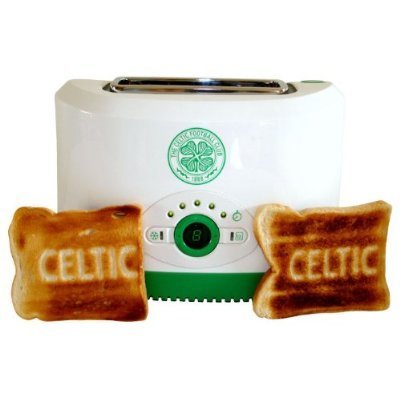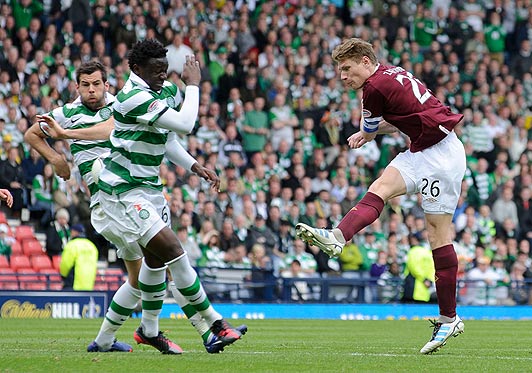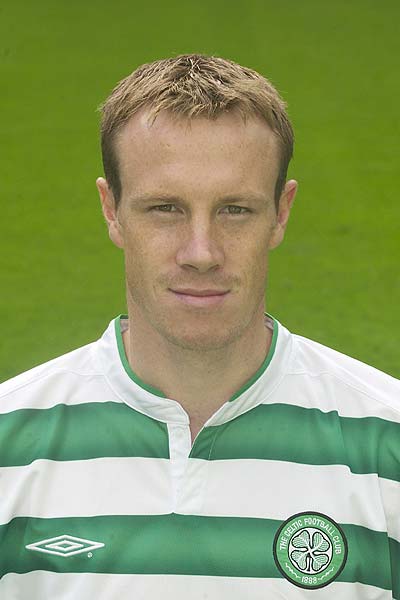Sadly the quirks of history have meant that the name ‘Manchester United’ has taken the place that should have belonged to Celtic as the most marketable football, or soccer, brand name on the planet. United can rely on their name and their name alone to market themselves and their brand. Just about any player, no matter how mediocre, is by virtue of being associated with United turned in image rights and repute terms from pauper to prince. The result? No less than to continually fill the United coffers on the back of it through shirt sales and related consumer expenditure.
Celtic, it is true, have made advancements in recent years in spreading the brand by signing players, but it is to be submitted that the ‘fan’ type we attract is a formula 1 style fan: fan of the individual as opposed to the team. Sure, it is likely the case that signing Ki will have had our profile raised in Korea, just as signing Nakamura did so in Japan. But whilst some will have caught the Celtic bug for good in the Land of the Rising Sun due to the vehicle of Nakamura’s signing, it is highly unlikely the the ‘Nakamura fan’ has remained en mass a follower of the hoops. Far less does our signing of a Kelvin Wilson type resonate as one that will excite a ‘Nakamura’ fan to return and buy into Celtic. Any signing, even at the level of a Bellamy or Robbie Keane is not comparable to Chelsea signing a new darling such as Torres (still vaunted in the Far East if not in England) or United signing – potentially – Sneijder. Rather, we are currently only able to cultivate these markets by signing their nationals and not by the force of a new signing alone in the way these clubs are. In short our ’emerging markets’ strategy only allow us to reap fans and monies whilst we continually renew our supply of their nationals.
How to address this problem leads me back to my original point about the brand tag and the Yankees. United, Chelsea etc. can turn paupers into princes and reap the resultant rewards because their brands are already established and, in turn, recognisable solely by their name in a way which we aren’t and cannot hope to be unless, and until, we emerge from the shackles of the SPL. However this does not leave us helpless in the instant moment; by developing a brand tag we can become recognisable and more marketable than purely holding ourselves out at as ‘Celtic’ allows us and thus retain forever more of the fans we gain when venturing into these markets.
Enter the Yankees: The Biggest Sporting Franchise in the World. Though the Yankees don’t need a tag, adopting it as a supplement to their identity rather than a primary marketing vehicle for their brand, we can use one instead to facilitate our brand’s development. What we need is a tag that defines us by our history, that is of itself one that could take popular hold and one that suggests that we are a movement that is attractive to be part of. One phrase fits all these boxes:
The Biggest Irish Sporting Movement in the World.
We are not merely a club, we are more. We are a movement. We are Irish by virtue of our roots and history, our colours are those of Eire, the flags we fly are too and we can realistically lay claim to being the biggest Irish (rooted) sporting franchise in global fan numbers at least.
Crucially, Ireland sells. It is no coincidence that the Visit Scotland adverts now mimic the hugely successful Discover Ireland adverts of old, both in their audio (seductive voice and folk music backgrounds) and visual (see mountains and pubs) respects. Secondly it is an immediate ‘in’ to our much coveted American market. What struck me most about New York was that the Irishmans’ influence is still massive. It is a far larger influence in the 21st century than I had ever comprehended it would have remained. For New York, read Boston and the great northern cities. Even in the south everyone wants to be Irish, claiming – and proudly too – a heritage. By aligning ourselves with this we become worthy of support and we will attract existential lasting support, not solely dependent upon our signing their countrymen. Indeed in America, such is the desire to find one’s Irish links and support anything Irish, we may well additionally find a willing market of ‘casual fans’ who will occasionally buy Celtic branded items so that they are showing their support for the emerald isle and keeping in touch with their roots.
The above can all be expanded; I for one would be relaxed about branding the area around Celtic Park as the ‘Eastern most part of Ireland’ or something else invoking such Irish imagery so as to attract new support. I don’t doubt current fans would be objection-less – in the main – as regards such an arrangement. The Stadium name itself is always going to be a contentious issue but would an all Irish association with Guinness for example really be unacceptable if we were to become a richer club with the European success rate of a Porto on the back of selling the naming rights, especially if ‘Celtic Park’ was retained as part of the name? An enlarged name of Guinness Celtic Park or even, to a lesser extent, renaming the north stand the Guinness Stand, would not alter the integrity of our history, nor would it prevent true fans staying loyal to our nomenclature of ‘Parkhead’, ‘The Park’, or simply Celtic Park.
After this it becomes an issue of how ambitious we want to be. New York has number of bars already branded as ‘Celtic’, would they accept sponsorship from us in return for the inclusion of Celtic memorabilia? Surprisingly though ESPN have tried a bar in NYC no football club has ever tried a similar thing in opening up a general bar which can subtly further their brand (as opposed to dedicated supporters bars ran by fans). This is somewhat surprising given that a good night in a bar often makes a person fond of the ‘vibe’ that that bar had; whether it be a style of music, a person, or a theme and want to learn more about the theme and spend more on this it. Even if we don’t go down this route, the most popular bars in New York are Irish bars and those who enjoy them – like those who seek their Irish heritage – will be quick to draw a link to Celtic if we market ourselves well enough and thus generate potentially more supporters and definitely more ‘one off’ revenue. In the end – like the major european powers – one day the force of our name alone will turn pauper to prince with the resistant rewards. Fortunately for Celtic, the means to achieve this will provide ends in themselves.
This – as so often seems to be the case in our recent history – is our moment, but it is a moment of a different kind than the transfer window post Seville or January 2008 when we could have progressed on the park to the next level given some boardroom ambition. This isn’t merely about short term success, rather our long term status rocketing to levels of old and beyond. As we know Celtic, frankly, regularly miss the moment to take the club to the next level and I must confess to a lack of confidence that the club will seize this one. So let us not wait; let the vocally resurgent fans – for which the Green Brigade deserve much credit – unofficially brand ourselves as the Worlds’s Biggest Irish Sporting Movement and force the issue to be so popular by virtue of banners, scarves, t-shirts, songs and forums that the club are themselves forced to adopt it as the official tag.
We are, Celtic, a movement and a movement is driven by the sheer force of its fellows. Let us seize this brand identity and take our club forward ourselves to the next level. And if we don’t? Alas, you can be sure our cousins of a different game from Boston, who too share the Celtic name, will one day click onto the full marketability of Irish Heritage and take our brand’s place in the 21st Century, just as our one time cousins in Manchester did in the 20th.





